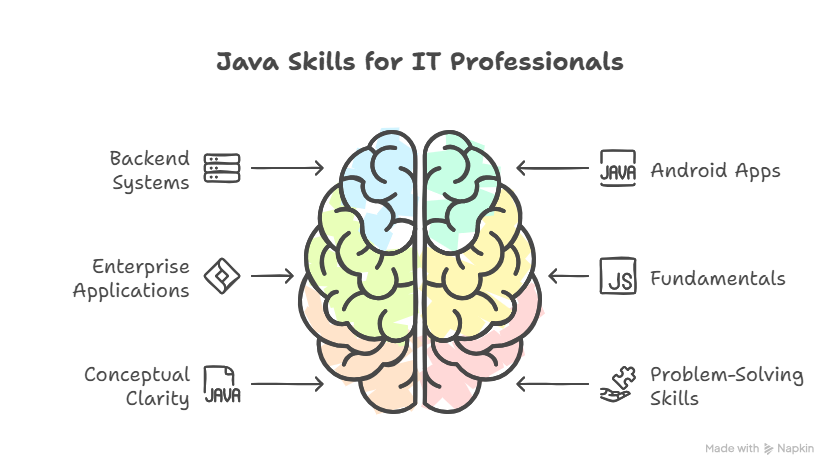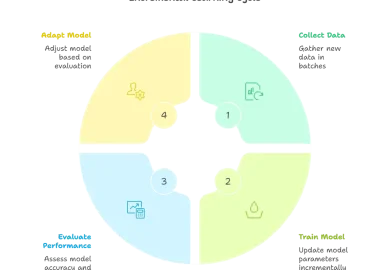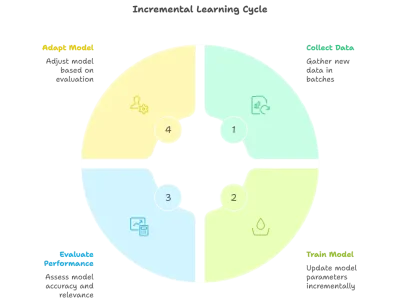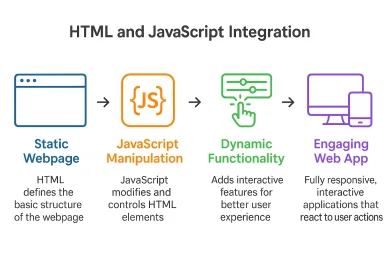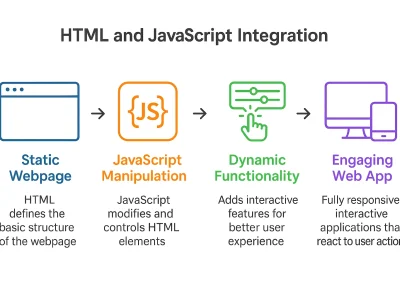Java remains one of the most in-demand programming languages, particularly for those entering the software development field. This comprehensive guide addresses the most important questions in a Java interview for freshers, providing clear explanations and practical examples.
Introduction
Java’s popularity in the job market is unmatched. Its object-oriented design, platform independence, and robust ecosystem make it essential for freshers aiming to launch a career in technology. This guide will help you prepare for interviews by covering the most frequently asked Java interview questions for freshers, providing clear explanations and practical examples.
Java Interview Questions for Freshers
- Java is widely used for backend systems, Android apps, and enterprise applications.
- Most IT companies expect a solid understanding of Java fundamentals.
- Interviewers assess not just coding ability, but also conceptual clarity and problem-solving skills.
Basic Java Concepts- (Questions 1–10)
Understanding core Java principles is essential for anyone preparing for Java interview questions for freshers. This section covers the foundational topics and concepts that are most frequently tested in interviews for entry-level Java positions.
1.What is Java and its main features?
Java is a highly recommended platform-independent, high-level object-oriented programming language with a simple syntax. We can compile the same code on any platform. Its main features include object-oriented design, robustness, Encryption, multithreading, and high performance due to its ability to run time optimization.
Java is a highly recommended platform-independent, high-level object-oriented programming language with a simple syntax.
Learn more in the official Oracle Java Documentation
2. What is JVM, JRE, and JDK?
- JVM (Java Virtual Machine): Runs Java bytecode and ensures platform independence.
- JRE (Java Runtime Environment): Collection of JVM and necessary Java libraries to code Java applications.
- JDK (Java Development Kit): It combines JRE, Compiler, and debugger to run a Java application
3. What is Difference between == and equals() method?
- == validates whether the two objects share the same object in memory.
- equals() validates whether the two objects have the same value.
Example: java String book = new String("JAVA Guide"); String author = new String("JAVA Guide"); System.out.println(a == b); // false System.out.println(a.equals(b)); // true
4. What are the main principles of OOP concepts in JAVA
- Encapsulation
- Inheritance
- Polymorphism
- Abstraction
5. What is the difference between String, StringBuffer, and StringBuilder?
- String: Immutable sequence of characters.
- StringBuffer: Allows modification and run bit by bit in multithreaded environments
- StringBuilder: Allows modification and runs faster only in single-threaded environments.
6. What are access modifiers in Java?
- private: Object/Method usable inside the class only
- default (no modifier): Object/Method usable within the declared package..
- protected: Object/Method usable within the declared package and its subclasses
- public: Object/Method usable from anywhere in the project
7. What is the difference between abstract class and interface?
- Abstract class: Can have method implementations, constructors, and state.
- Interface: Only abstract methods (though Java 8+ allows default/static methods), no constructors, supports multiple inheritance.
8. What is method overloading and method overriding?
- Overloading: Methods are defined by the same name with different parameters in the same class
- Overriding: Providing a new execution for a superclass method in a subclass.
9. What is a constructor in Java?
A constructor is a special method used to initialize objects. It has the same name as the class and no return type.
Example: java class Student { Student() { System.out.println("Student registered"); } }
10. What is static keyword in Java?
The static keyword is used for class-level variables and methods. Static members belong to the class, not to any specific object.
Object-Oriented Programming Questions (Questions 11–20)
Object-oriented programming forms the backbone of many Java interview questions for freshers. Here, you’ll find commonly asked questions on inheritance, polymorphism, encapsulation, and abstraction, helping you build a strong conceptual base for technical interviews.
11. What is inheritance and its types?
Inheritance is a type where one class accesses the properties and behaviors of another class. Types include single, multilevel, and hierarchical inheritance. Java does not support multiple inheritance directly to avoid ambiguity.
12. What is polymorphism? Explain with example?
Polymorphism makes the instances take any form. Some of the polymorphism techniques are method overriding and method overloading
Example: java class Student { void New User() { System.out.println("New student registered"); } } class Student extends Old { void sound() { System.out.println("Old student registered"); } }
13. What is encapsulation? How is it achieved?
Encapsulation allows the object to access the same data. It is achieved by making variables private and providing public getter and setter methods.
14. What is the super keyword?
The super keyword is used to refer to the instantaneous parent class object, call parent methods, or invoke the parent class constructor.
15. What is method hiding vs method overriding?
- Method hiding occurs when a subclass defines a static method with the same signature as a static method in the parent class.
- Method overriding occurs when a subclass again defines a method with a specific implementation that is already defined in its parent class.
16. Can you Override static methods?
Static methods don’t belong to the class, not to instances, and cannot be overridden. They can only be hidden.
17. What is final keyword in Java?
- final variable: Value cannot be changed.
- final method: Cannot be overridden.
- final class: Cannot be extended.
18. What is abstraction and how is it implemented?
Abstraction hides the complexity of a system by exposing only the necessary details. It is implemented using abstract classes and interfaces.
19. Difference between composition and inheritance?
- Inheritance represents an “is-a” relationship (e.g.,a Registered Student is a new user).
- Composition represents a “has-a” relationship (e.g., A registered student has a Scholarship score), achieved by including objects as fields within a class.
20. What are the Advantages of OOP?
- Code reusability
- Modularity
- Scalability
- Easier maintenance
Java Fundamentals and Syntax (Questions 21–30)
A solid grasp of Java fundamentals and syntax is vital for tackling Java interview questions for freshers. This section addresses data types, arrays, loops, and control statements—topics that often appear in both written and oral interview rounds.
21. What are primitive data types in Java?
Java has eight primitive data types: byte, short, int, long, float, double, char, and boolean.
22. What is the difference between primitive and non-primitive data types?
- Primitive types are essential types without declaring any objects.
- Non-primitive types are objects such as Strings, arrays, and classes.
23. What are wrapper classes?
Wrapper classes give out the path to use primitive data types as objects. Examples include Integer, Double, and Character.
24. What is Autoboxing and unboxing?
- Autoboxing: Primitive type automatically converts to its corresponding wrapper class.
- Unboxing: Wrapper class objects are converted back to their primitive type.
25. What are arrays in Java?
Arrays are fixed-size, ordered collections of elements of the same type.
Example: java int[] userID = {12, 23, 32};
26. Difference between Array and ArrayList?
In Arrays, Sizes are fixed while defining the objects and primitive types. ArrayLists are dynamic in size and used to store objects only. Array Lists give in-built methods for adding, removing, and managing elements.
27. What are Loops in Java?
Java supports for, while, and do-while loops for repeated execution of code blocks.
28. Difference between break and continue?
- break: Exits the loop immediately.
- continue: Pass up the current iteration and move to the next one.
29. What is conditional statements in Java?
Java uses if, else if, else, and switch statements to control the flow of execution based on conditions.
30. What is the switch statement?
The switch statement allows multi-way branching based on the value of a variable.
Example:
java switch (Course) { case 1: System.out.println("JAVA"); break; default: System.out.println("Python");
}
Exception Handling and Advanced Concepts (Questions 31–40)
Interviewers frequently include exception handling and advanced topics among Java interview questions for freshers. In this section, you’ll review error management, multithreading, collections, and memory handling, all of which are crucial for demonstrating your readiness for real-world Java development.
31. What is exception handling in Java?
Exception handling is a mechanism to handle runtime errors using try-catch blocks, ensuring the program runs smoothly even if errors occur.
32. Difference between checked and unchecked exceptions?
- Checked exceptions are checked at IO Exception (compile time).
- Unchecked exceptions are checked at NullPointerException (runtime exception).
33. What are try, catch, and finally blocks?
- try: Contains exceptional code.
- catch: Handles the exception.
- finally: Executes with no consideration of whether an exception occurred.
34. What is throw and throws keyword?
- throw: Used to throw an exception explicitly.
- throws: Declares that a method may throw certain exceptions.
35. What is multithreading in Java?
Multithreading allows multiple threads (lightweight processes) to run simultaneously, improving the performance of applications.
36. Difference between process and thread?
A process is an independent executing program with its own memory space. A thread is a lightweight process that shares memory with other threads within the same process.
37. What are collections in Java?
Collections are frameworks for storing and manipulating groups of objects, such as List, Set, and Map.
38. What is the difference between List, Set, and Map?
- List maintains ordered collection and allows duplicates (e.g., ArrayList, LinkedList).
- Set allows unique collection and does not guarantee order (e.g., HashSet, TreeSet).
- Map stores key-value pairs and does not allow duplicate keys (e.g., HashMap, TreeMap).
39. What is garbage collection in Java?
Garbage collection is the automatic process of reclaiming memory by removing objects that are no longer in use.
40. What are the basic input/output operations in Java?
Input can be handled using classes like Scanner and BufferedReader, while output is typically managed with System. out and PrintWriter.
Tips for Java Interview Success
By practicing these Java interview questions for freshers, you’ll improve your confidence and technical skills. Regular coding practice on platforms like LeetCode, HackerRank, and CodeChef will help you become familiar with different problem types.
- Practice coding regularly using online platforms.
- Explain your answers clearly and logically during interviews.
- Avoid common mistakes such as ignoring edge cases or writing unoptimized code.
Practice Resources and Next Steps
- Use platforms like LeetCode, HackerRank, and CodeChef for hands-on practice.
- Build small Java projects to strengthen your portfolio.
- Consider career paths starting as a Java Developer, then progressing to Senior Developer, Architect, or specializing in frameworks like Spring or Android.
Conclusion
Regularly reviewing Java interview questions for freshers is essential for success in your job search. A clear understanding of core concepts, combined with consistent practice and the ability to communicate your thought process, will set you apart from other candidates. Stay confident, keep learning, and approach each interview as a valuable learning experience on your path to becoming a Java developer.

